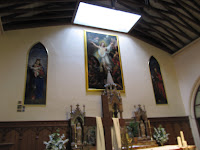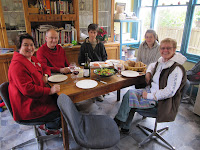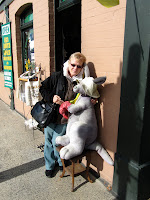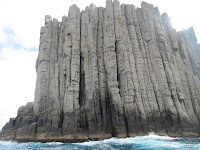
 We had our own room with a poster bed that had been made originally for Queen Elizabeth to use on her visit to Hobart, but which then had been sold when the Queen's visit had been cancelled!
We had our own room with a poster bed that had been made originally for Queen Elizabeth to use on her visit to Hobart, but which then had been sold when the Queen's visit had been cancelled!  From our bedroom window we could watch the sun shine over Mount Wellington, Hobart's central and highest dolomite cliffs.
From our bedroom window we could watch the sun shine over Mount Wellington, Hobart's central and highest dolomite cliffs.  One clear day when we drove up the high mountain, the road got ever narrower as the view got ever more incredible!
One clear day when we drove up the high mountain, the road got ever narrower as the view got ever more incredible! 
 We enjoyed a stroll along Sullivan's Cove Harbour and checked out some of the buildings and churches in central Hobart.
We enjoyed a stroll along Sullivan's Cove Harbour and checked out some of the buildings and churches in central Hobart. 
 We also went for lunch to some acquaintances who live in the beautiful historical area of Battery Point.
We also went for lunch to some acquaintances who live in the beautiful historical area of Battery Point.
 In the evening we went to an Easter vigil service with our hosts.
In the evening we went to an Easter vigil service with our hosts. The next morning we drove down to the south-eastern Tasman peninsula. We took a fantastic eco-tour boat cruise 

 albatross,
albatross,  shearwater birds, and had a pod of dolphins swim along and under the boat, jumping up in pairs just like at Sea World (maybe not as high, but definitely not on command - very hard to capture in picture because of the unpredictability of their antics!)
shearwater birds, and had a pod of dolphins swim along and under the boat, jumping up in pairs just like at Sea World (maybe not as high, but definitely not on command - very hard to capture in picture because of the unpredictability of their antics!) 
 The waves were very rough on one side of the island and sometimes it felt like being on a roller coaster ride, but on the other side, the waters were relatively calm!
The waves were very rough on one side of the island and sometimes it felt like being on a roller coaster ride, but on the other side, the waters were relatively calm! 
In the afternoon we took a visit to see the historical Port Arthur penal colony – it was a most interesting place. Port Arthur was much more than just a prison. It was a beautifully landscaped community, home to military personnel and free settlers. Many of the homes and offices were still standing. The penal institutions were mostly in ruins, although some are now being restored. Whereas the penal history used to be regarded as a shameful thing and an embarrassment to Australians, it is now a place of national and international significance, part of the epic story of the settlement of Australia. The people are proud to be descendants of convicts!



The convicts were made to work hard at farming and industries, and were treated most inhumanely, working in ball and chains for the duration of the day. We watched a short play called "The Man Who Threw a Stone" about a convict's story in the Separate prison where the worst offenders were held in isolation. To add to the drama, we were locked in for its duration! 

 We also were given a short harbour cruise to see the site where young boys as young as 9 years old were held.
We also were given a short harbour cruise to see the site where young boys as young as 9 years old were held. 
 There was an "Isle of the Dead" where over 1100 prisoners were buried.
There was an "Isle of the Dead" where over 1100 prisoners were buried. 
On another day we headed to the coastal resort of Carlton to meet up with the family of a Winnipeg friend for an authentic Fish and Chips lunch. 

 We also visited the historical city of Richmond, where we toured the Richmond Gaol Historic Site, also steeped in grisly convict stories.
We also visited the historical city of Richmond, where we toured the Richmond Gaol Historic Site, also steeped in grisly convict stories. 
 In Richmond we also stopped to see the town's historic church with its famous restored painting of the Resurrection
In Richmond we also stopped to see the town's historic church with its famous restored painting of the Resurrection 
Another highlight was seeing the uniquely carved artistic installation at Meadowbank Estate, near Richmond in the Coal River Valley, which describes the "Flawed History"  of the Tasmanian wine industry in a humorous vein. The art and poetry installation comprises a wood cut-out floor mural, or timber mosaic, filled with stanzas of puns, humour and nonsense verse.
of the Tasmanian wine industry in a humorous vein. The art and poetry installation comprises a wood cut-out floor mural, or timber mosaic, filled with stanzas of puns, humour and nonsense verse. 
 of the Tasmanian wine industry in a humorous vein. The art and poetry installation comprises a wood cut-out floor mural, or timber mosaic, filled with stanzas of puns, humour and nonsense verse.
of the Tasmanian wine industry in a humorous vein. The art and poetry installation comprises a wood cut-out floor mural, or timber mosaic, filled with stanzas of puns, humour and nonsense verse. 
After checking out so much of the penal history of Tasmania, we felt it was most appropriate to end our stay in Hobart with a delicious steak dinner at the Ball and Chain Restaurant, part of a wharf and buildings complex constructed by chain gangs of convicts in the 1830's. 

























































No comments:
Post a Comment